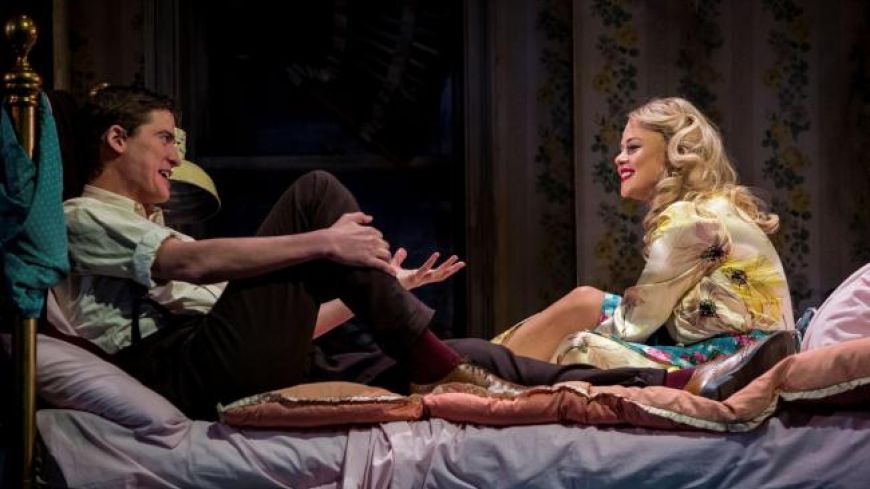
When Hollywood bought the film rights to the novella, “Breakfast at Tiffany’s”, Truman Capote was adamant that Marilyn Monroe should star as Holly Golightly but it was Audrey Hepburn who immortalised the free-spirited heroine with sophisticated Givenchy- style.
As Capote described her: “the colours of her hair, tawny streaks, strands of albino blond and yellow .. a black dress, black sandals, a pearl choker …. a pair of sunglasses blotting out her eyes .. she was shy two months of her nineteenth birthday.”
In this new dramatisation, Emily Atack (best known as Charlotte in E4 series The Inbetweeners), is making her stage debut as Holly with flowing wavy blonde hair, chic shades and a wardrobe of fabulous frocks. Grace Kelly to a T.
The period setting is New York City time travelling between 1944 and 1957, well captured through bluesy jazz music and a backcloth of the Manhattan skyline. The impressive stage design depicts an East 70s Brownstone block with towering fire escape, apartment doors, windows, beds, chaise longue, restaurant tables and cocktail bars flown and tracked into place, scene by scene.
The story of Holly’s adventurously romantic life is related by the unnamed narrator, an impoverished writer bashing away on his typewriter while frequently disturbed and distracted, day and night, by his party girl neighbour. Like Isherwood’s Sally Bowles, she’s always out on the town with a constant array of gentlemen admirers who pay for dinner, drinks and the powder room and then escort her home in the wee sma’ hours.
They first meet personally when Holly climbs in his window to escape an amorous encounter in her apartment downstairs; she nicknames him Fred after her much loved brother, chattering about her evening, family and how Thursdays are “gruesome”, but unfortunately Emily Atack’s softly spoken and fast speed delivery masked much of the dialogue. This scene reveals a glimpse of her undercover life so clarity of diction and plotline is essential.
Matt Barber plays “Fred” with a charming innocence, rather shocked but also bewitched by Holly’s promiscuous lifestyle. He is boyish and gauche, she is wild, wilful and carefree as a bird, yet both drifters, sharing a dream to find their place in the world.
The movie has been described as a more humorous, sunny and sentimental version of the novel while this stage play is a darker, literal portrait of Holly’s rather tortured life and torrid love affairs, past and present. To dramatise these episodes, Fred reflects on happier times through evocative and poignant scenes, enriched with Capote’s poetic language from page to stage.
Joe Bell, the loyal, caring bar tender – quietly, astutely played by Victor McGuire - mixing Martinis and taking flowers out of a vase as a gift for Holly; the reminiscences of Doc Golightly (portrayed with heartfelt sadness by Robert Calvert), as he recalls Holly maturing from child to woman, “reading dreams, that’s what started her walking down the road a mile and came home; one day she just kept going.”
The ensemble cast play a host of characters, party guests, sailors, neighbours, police, publisher, the Press. After a slow start, Act 2 is slicker with imaginatively directed vignettes, music, lighting, rain drenched streets, to theatrical effect. The underlying romantic mood is enhanced by a few melancholic songs – “ People will say we’re in love”, from Oklahoma and also the movie classic “Moon River,” simply performed by Holly on guitar sitting on her bed, as Fred listens outside on the fire escape in the soft shadows of dusk.
In her gentle, sweet natured performance, Atack emphasises more of the gloss rather than the true grit of the character’s dual personality. His fluid, fluctuating friendship with Holly is an emotional strain on Fred, well illustrated by Barber, who strives to understand this tough cookie of a lady: she appears to treat men appallingly but perhaps beneath her glamorous veneer and dark glasses, she has a vulnerable heart.
Her calling card reads: “Miss Holly Golighly, Travelling.” Just like her cat, she’s independent, living on the edge of society, unable to settle down. To escape her demons and fears, “the mean reds,” a visit to Tiffany’s is the only cure:
“It calms me down right away, the quietness and the proud look of it; nothing very bad could happen to you there, not with that lovely smell of silver and alligator wallets. If I could find a real-life place that made me feel like Tiffany's, then I'd buy some furniture and give the cat a name.”
Showtimes
Monday 30th May to Saturday 4th June, 2016
Touring dates – www.breakfastattiffanys.co.uk

